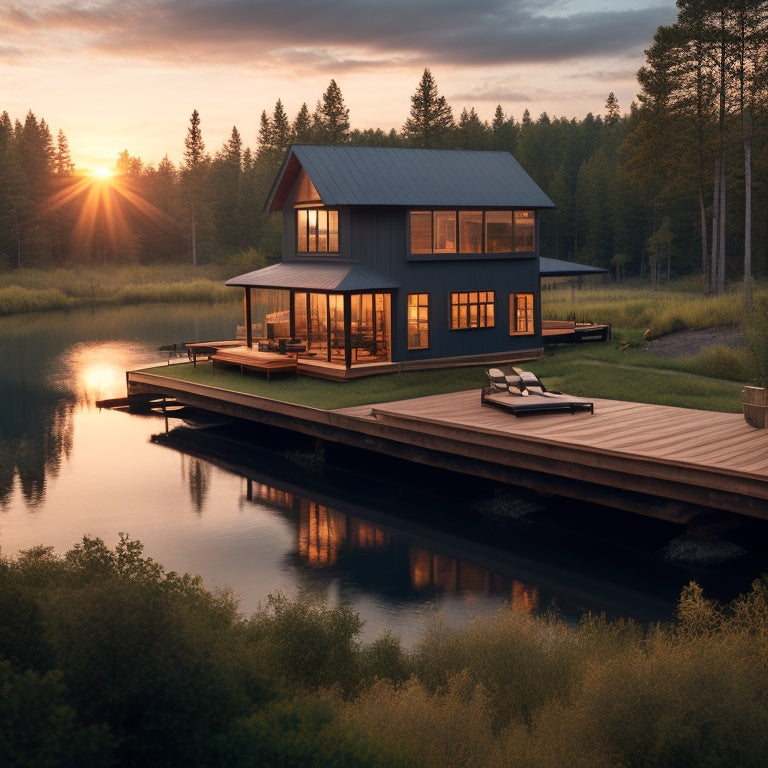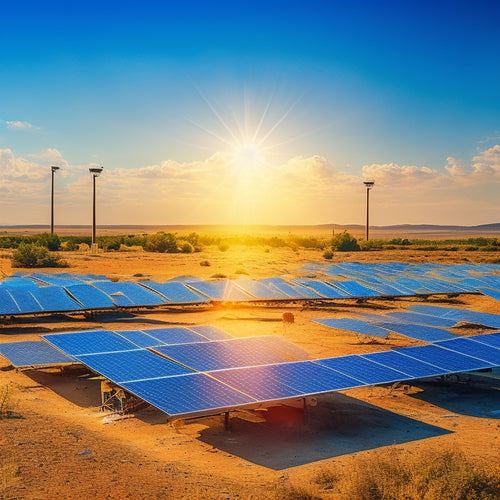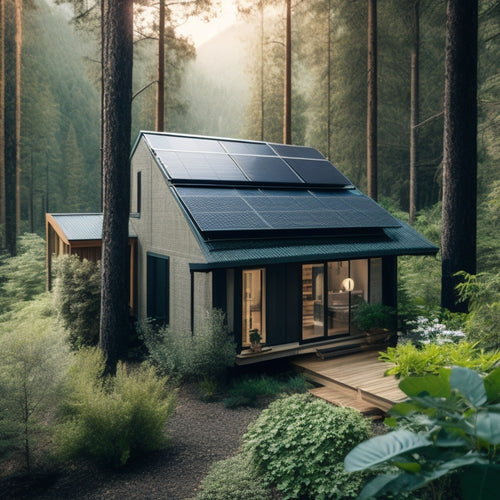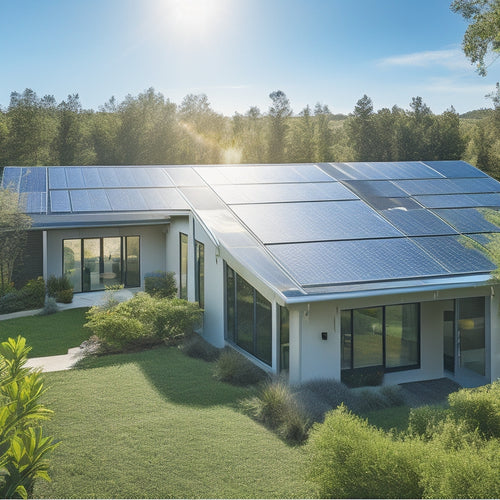
Solar Panels for Off Grid Cabin
Share
You're contemplating solar panels for your off-grid cabin to achieve energy independence and reduce your reliance on non-renewable energy sources. To get started, it's crucial to evaluate your energy demands by calculating your daily energy usage, accounting for appliances like refrigerators, lights, and laptops. You'll want to think about key components like solar panels, battery storage, and inverter technology to guarantee reliable energy generation and storage. By optimizing your system with Maximum Power Point Tracking and proper panel orientation, you can increase energy production and reduce your carbon footprint. Now that you've taken the first step, you can investigate further to find the perfect balance of energy efficiency and sustainability for your off-grid cabin.
The Essentials
- Off-grid solar systems require careful planning, including calculating daily energy usage and selecting the right components, such as solar panels, batteries, and inverters.
- Proper solar panel orientation and seasonal adjustments can enhance energy production by up to 40%, while Maximum Power Point Tracking (MPPT) technology can optimize output.
- Deep-cycle batteries are crucial for reliable energy storage, and efficient power conversion is necessary for maximizing generated energy in off-grid systems.
- Assessing potential shading sources and implementing strategies, such as string inverters and panel-level MPPT devices, can minimize energy losses caused by shading.
- Setting realistic energy efficiency goals and prioritizing essential appliances can help ensure a sustainable and reliable off-grid energy system for your cabin.
Renewable Energy for Remote
You're likely considering renewable energy for your remote off-grid cabin to achieve energy independence.
This matters because it allows you to disconnect from the grid and rely on your own power generation.
When it comes to off-grid power solutions, designing and installing a reliable system that meets your unique energy needs can be a challenge renewable energy solutions.
Off-grid power solutions, like solar panels, offer a reliable and sustainable way to meet your energy needs.
Energy Independence Matters
How essential is energy independence when living off the grid? You're not just seeking freedom from utility bills; you're embracing a sustainable lifestyle that relies on eco-friendly practices and renewable resources.
Self-sufficiency skills are important in this pursuit, as you'll need to manage resources and mitigate environmental impact. Independent living off the grid requires a profound comprehension of resource management, guaranteeing you can sustain yourself without reliance on external systems.
By utilizing off-grid solar systems, you can minimize your reliance on non-renewable sources and create a dependable energy supply. Additionally, incorporating renewable energy systems into your off-grid setup can greatly reduce your energy expenses.
Green technology, like solar panels, is a cornerstone of off-grid living. By utilizing renewable energy, you're reducing your reliance on non-renewable sources and minimizing your carbon footprint.
Community support is essential in this path, as shared knowledge and proficiency can help you overcome challenges and optimize your setup.
As you aim for energy independence, remember that it's not just about cutting ties with the grid; it's about adopting a comprehensive approach to living that prioritizes sustainability, self-reliance, and environmental stewardship.
Off-Grid Power Solutions
Most off-grid cabins require a dependable power solution that can efficiently capture and convert renewable energy. As you evaluate off-grid power solutions for your cabin, you'll want to assess your energy needs and choose the right components for your system. This typically includes solar panels, battery storage, and an inverter technology that converts DC power to AC.
Effective energy management is vital to guarantee you're generating and storing enough power to meet your needs. When installing your system, take into account factors like site assessment, installation tips, and maintenance practices to promote peak performance.
Additionally, many off-grid dwellers struggle with inconsistent energy supply due to inefficient panel configurations, leading to frequent power outages and equipment damage. This is why it's important to evaluate Off Grid Solar Panel Kits that provide a thorough and efficient solution.
Conduct a detailed cost analysis to determine the best value for your investment. By choosing sustainable living solutions, you'll reduce your environmental impact and enjoy the freedom of off-grid living.
Don't forget to include a power backup plan to guarantee you're prepared for unexpected outages. With the right off-grid power solution, you'll be able to enjoy your cabin while minimizing your reliance on public utilities.
Zero Energy Bills Guaranteed
You've successfully shifted to an off-grid lifestyle, and now you're ready to enjoy the benefits of energy independence.
By investing in a complete solar power solution, such as off grid energy solutions, you'll be well on your way to achieving energy autonomy.
With a solar panel system, you'll generate your own renewable energy, reducing your reliance on the grid and wiping out your energy bills.
Energy Independence Achieved
As you disconnect from the grid, solar panels become the linchpin of your off-grid cabin, catapulting you toward energy independence. This means you'll no longer be reliant on external power sources, freeing you to live a sustainable lifestyle on your own terms. With solar panels, you can power your cabin renovation, ensuring a self-sufficient abode that's both environmentally friendly and cost-effective.
| Benefits | Description |
|---|---|
| Zero Energy Bills | No more surprise electricity bills, giving you financial freedom and peace of mind. |
| Reduced Carbon Footprint | Generate clean, renewable energy, minimizing your impact on the environment. |
| Increased Property Value | Solar panels can increase your cabin's value, making it a more attractive investment. |
| Government Incentives | Take advantage of tax credits and rebates for installing solar panels, offsetting the initial cost. |
Renewable Energy Source
Solar panels capture the sun's energy, converting it into electrical power that fuels your off-grid cabin. This renewable energy source is a significant breakthrough for sustainable living, allowing you to break free from reliance on the grid and enjoy zero energy bills.
With solar energy, you're utilizing the power of the sun to generate electricity, reducing your carbon footprint and minimizing your impact on the environment.
As a homeowner, you'll appreciate the peace of mind that comes with knowing your energy needs are met without relying on external suppliers. Solar panels are a dependable and efficient way to power your off-grid cabin, providing a consistent flow of energy even on cloudy days.
By investing in solar energy, you're investing in your independence and freedom from the grid.
With solar panels, you can enjoy the benefits of sustainable living, including reduced energy costs, increased energy security, and a smaller carbon footprint.
Maximum Power Point Tracking
You need to optimize energy harvesting by guaranteeing your solar panels operate at their maximum power point (MPP) to maximize energy production.
With an extensive solar kit, incorporating renewable energy systems, you can guarantee a reliable and efficient energy supply for your off-grid cabin.
Maximum power point tracking (MPPT) technology helps you achieve this by continuously monitoring and adjusting the panel's output to match the MPP.
Optimizing Energy Harvest
Maximizing energy harvest from your solar panels is vital to powering your off-grid cabin. You'll want to make sure you're getting the most out of your system, especially when you're not connected to the grid.
To optimize energy harvest, you'll need to take into account solar panel orientation. Proper orientation can increase energy production by up to 40%. You'll want to position your panels at an angle that allows them to receive direct sunlight for the longest period possible. This may require adjusting the angle seasonally to account for the sun's changing position.
Another important aspect of optimizing energy harvest is selecting the right energy storage solutions. You'll need a battery bank that can store excess energy generated during the day for use during the night or on cloudy days.
Think about using deep-cycle batteries designed specifically for off-grid systems. These batteries can handle the daily charge and discharge cycles, making sure you have a reliable source of power.
Efficient Power Conversion
Every off-grid cabin's solar panel system relies on efficient power conversion to guarantee that the energy generated is employed to its full potential. You need to verify that your system is optimized to extract the maximum amount of energy from your solar panels.
This is where Maximum Power Point Tracking (MPPT) comes in – a vital aspect of efficient power conversion.
MPPT is a technique used to optimize energy harvest by identifying the maximum power point of your solar panels and adjusting the operating voltage to match it. This results in a significant increase in energy production, especially during periods of low sunlight.
By incorporating MPPT into your power conversion system, you can expect up to 30% more energy output compared to traditional systems.
Recent solar efficiency advancements have led to the development of advanced power conversion technologies, allowing for even higher energy yields. These technologies enable your system to adapt to changing environmental conditions, guaranteeing maximum energy production even on cloudy days.
Assess Your Energy Demands
You'll need to calculate your daily energy usage to determine the size of the solar panel system required for your off-grid cabin. This involves accounting for the wattage and usage hours of each appliance, as well as any energy efficiency goals you've set for your cabin.
When selecting a solar battery, consider options like Renogy deep cycle solar batteries that can provide reliable energy storage for your off-grid system.
Daily Energy Usage
How much energy do you need to power your off-grid cabin daily? Understanding your daily energy usage is vital in determining the size of your solar panel system. To calculate your energy consumption, you need to identify your usage patterns and appliances that consume the most energy.
| Appliance | Wattage | Hours of Use |
|---|---|---|
| Refrigerator | 150W | 24 |
| Lights (5) | 10W each | 8 |
| Laptop | 65W | 4 |
| Water Pump | 250W | 2 |
Total daily energy consumption can be calculated by multiplying the wattage of each appliance by the number of hours it's used. Based on the example above, your total daily energy consumption would be:
150W x 24h = 3600Wh (Refrigerator)
10W x 5 x 8h = 400Wh (Lights)
65W x 4h = 260Wh (Laptop)
250W x 2h = 500Wh (Water Pump)
Total daily energy consumption: 4360Wh
Energy Efficiency Goals
Having calculated your daily energy consumption, you can now assess your energy demands to optimize your off-grid cabin's energy efficiency. This step is vital in determining the right size of your solar panel system and energy storage capacity.
To set realistic energy efficiency goals, consider your priorities: do you want to power only essential appliances or support a more luxurious lifestyle? Identify areas where you can adopt sustainable practices to reduce your energy demands. For instance, using energy-efficient LED lighting and appliances can greatly lower your consumption.
Next, evaluate your energy storage needs. Will you require a battery bank to store excess energy generated during the day for nighttime use or during periods of low sunlight?
Consider the depth of discharge, cycle life, and maintenance requirements of your energy storage system. By understanding your energy demands and setting realistic goals, you can design a solar panel system that meets your needs, guarantees energy independence, and minimizes your environmental footprint.
Higher Efficiency in Shading
You'll want to contemplate shading loss mitigation strategies to maximize your off-grid cabin's solar panel efficiency.
Shading from trees, buildings, or other obstructions can considerably reduce energy production, so it's essential to assess potential shade sources and optimize panel placement accordingly.
Shading Loss Mitigation
Shadows cast by trees or other obstructions can markedly reduce the energy output of your solar panel array, a phenomenon known as shading loss. To mitigate this, you'll need to implement shading strategies that optimize your panel positioning.
One approach is to use a string inverter with multiple maximum power point tracking (MPPT) inputs, allowing each string of panels to operate independently and maximize energy output. This setup enables you to minimize the impact of shading on individual strings while still generating power from the rest of the array.
Additionally, consider using panel-level MPPT devices, which can further reduce shading losses by optimizing energy output at the individual panel level. By positioning your panels in a way that minimizes shading, such as installing them at an angle or using a tracking system, you can also reduce energy losses.
Frequently Asked Questions
Can I Install Solar Panels on My Cabin's Metal Roof?
You can install solar panels on your metal roof, but first, make certain the roof's material and structure are compatible with the panels' clamping system, and verify the metal roof installation meets the manufacturer's solar panel compatibility requirements.
Are Solar Panels Resistant to Extreme Weather Conditions?
"When it rains, it pours," but you'll find solar panels are built to withstand the storm. They're designed with solar durability in mind, ensuring high-quality weather performance even in extreme conditions, so you can stay powered up and off the grid.
How Often Should I Clean My Solar Panels for Optimal Performance?
You should clean your solar panels every 6-12 months to prevent dirt accumulation, ensuring ideal performance; regular solar panel maintenance is essential, as dirty panels can reduce energy output by up to 25%.
Can I Use Solar Panels to Charge My Electric Vehicle?
You can use solar panels for solar charging, but make certain your setup is EV-compatible, considering factors like power output, voltage, and charging speed to efficiently fuel your electric vehicle, granting you freedom from fossil fuels.
Are There Any Government Incentives for Off-Grid Solar Installations?
As you begin on utilizing the sun's energy, you'll find a ray of hope - federal tax credits and state rebates await, illuminating your path to independence; claim up to 26% of your installation costs, and shine brighter with reduced expenses.
Final Thoughts
You've finally escaped the grid, only to find yourself tied to a noisy generator. The irony isn't lost on you - trading one dependency for another. But solar panels for your off-grid cabin can be a transformative solution. With maximum power point tracking and higher efficiency in shading, you'll be utilizing the sun's energy like a pro. Assess your energy demands, and you'll be on your way to zero energy bills - guaranteed. It's time to truly go off the grid, and stay there.
Related Posts
-

What Happens Without a Charge Controller in Solar Panels
Without a charge controller in your solar panel system, you risk overheating batteries due to overcharging, which can...
-

Off Grid Solar Batteries
As you shift to off-grid living, you'll rely on high-performance solar batteries to store excess energy generated by ...
-

Installing Metal Solar Roofs for Maximum Energy Efficiency
Installing metal solar roofs can drastically enhance your home's energy efficiency and durability. These roofs withst...


